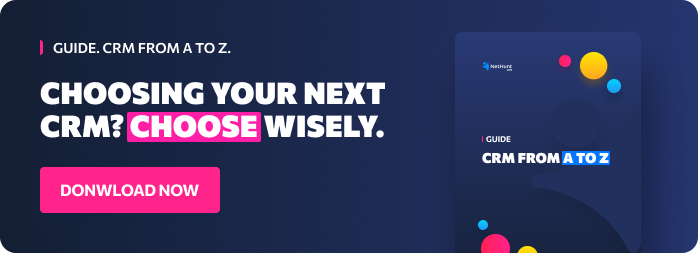Go big or go home! Or should you?
When a CRM solution seems like a waste of money, act the same way you would when breaking up with your partner that it no longer works with. Just throw in the cheesy ‘it’s not you, it’s me’.
But this time, actually mean it.
- Less than 37% of sales reps use their company’s CRM system.
- 43% of CRM customers use fewer than half their CRM's features.
- 72% of CRM users would trade functionality for ease of use.
Source: CSO Insights
One of the key reasons why your CRM doesn’t work is because there’s a mismatch between your business’ specific needs and the features your CRM offers. Instead of chasing the big boys and implementing an enterprise CRM for your SaaS startups, you should look into CRM for small business. Similarly, instead of piling up on paid modules and milking that small business software once you’ve grown out of it, maybe it’s time to consider an enterprise CRM.
In the article, we explain the difference between the two and give actionable advice regarding which one to choose for your business for the best results.
What is a CRM for Small Business?
A CRM for small businesses - also known as niche CRM - is customer relationship management software that caters to small and mid-sized businesses, helping them handle customer relationships, track sales, and streamline marketing processes.
The target market for small business CRM is primarily startup and growing companies, where interactions with clients are handled by a single sales team or several smaller teams. Therefore, small business CRM vendors offer limited functionality and tend to focus on the needs of the sales department, enriching their solution with features like contact management and calendars.
Instead of being heavily focused on providing every feature imaginable, small business CRM vendors work on improving usability. Their main goal is to make the software easy to deploy, straightforward, and intuitive. That way, small business CRM users can set up and run the solutions easily, without an IT manager or a CRM administrator stepping in.
Examples of small business CRMs include NetHunt CRM, Monday.com, Salesmate and Pipedrive.
What is an Enterprise CRM?
In the context of ‘Enterprise CRM’, the word ‘enterprise’ describes a very large company. Following this logic, enterprise CRM is CRM software that is designed for organisations with more complex business workflows and robust business needs. Thanks to the multitude of different modules available to enterprise CRM users, it helps to accommodate compound operations that span multiple countries, territories, and product lines.
Enterprise CRM solutions traditionally target large corporations that operate enormous databases and consist of multiple customer-facing departments and sales teams. That’s why the main unique selling proposition of these solutions is centralised and instant access to CRM data made possible by the peculiarities and location-based problems that arise with enterprise CRM deployment.
Other defining properties of enterprise CRMs include high-level sales automation functionality, exhaustive contact management, and supporting scheduling functionalities to effectively sustain a large company’s operations.
Examples of enterprise CRMs include Salesforce CRM, Microsoft Dynamics, Oracle, and SAP.
Alternative software for an enterprise-level organisation could be an ERP system. Learn more about ERP vs CRM, their key features and main differences in our article.
How are they different?
Both types of CRM software share three core services that they serve - to manage data more efficiently, to create better-targeted and more personalised sales outreach, and to help provide personalised, educated customer service support. Despite being designed with different types of companies in mind, both small business CRM and enterprise CRM share plenty of similarities...
- They help capture and centralise accurate, real-time customer information such as contact info, accounts, leads, and purchases history.
- They provide each authorised member of a company’s team with the opportunity to access and use information to manage customers more effectively.
- They help improve customer experience by giving access to more informed and intelligent interactions.
Moreover, regardless of the type of the system, it can be either B2B or B2C-oriented, have a mobile application, and offer a trial version of the solution. However, there is a set of type-specific characteristics that lay out the difference between small business CRMs and enterprise CRMs: features, deployment options, pricing mode, UI/UX, learning curve, and integration.
Must-have features of Small Business CRM and Enterprise CRM
Traditionally, small business CRM vendors try to make their product as affordable and easy to navigate as possible, which results in the functionality of small business CRMs being more focused on providing the standard stack of features more beneficial to smaller companies...
- Contact management. The ability to store, organise, segment and track information about your prospects, leads and customers.
- Sales pipelines management. The ability to organise your sales pipeline and track the movement of leads down it. In order to provide a straightforward timeline that shows the start, progress, and end of each deal.
- Task management. The ability to set up, assign and prioritise time-bound tasks for yourself or members of your team.
- Reporting. The ability to interpret customer data, track and analyse your sales progress and team performance to gain insights into your leads and customers’ behaviour patterns.
Although the aforementioned four features are pillars of a small business CRM system, it doesn’t mean the functionality is limited to just those. As the small business CRM software market expands, more and more vendors offer more complex functionality such as sales automation features, social media marketing functionality, email marketing functionality and more.
One of the benefits of niche CRM is that it lets you customise your system instead of making you make the most out of a one-size-fits-all-approach enterprise CRM. You can easily find a solution that has a number of add-ons and modules specific to your business and tailor the system to accommodate your exact needs.
Enterprise businesses, on the other hand, need to put everything on the assembly line and streamline as many processes as possible. They require an elaborate system that has every feature imaginable or is actively working towards developing it. It’s common for enterprise CRMs to have a wide range of features that accommodate even the most complex business processes of large corporations.
On top of the standard small business CRM features, enterprise CRMs offer the following…
- Customer opportunity management.
- Advanced contact management.
- Sales analytics.
- Sales automation.
- Marketing automation
- Sales forecasting
Deployment
Small business CRMs are traditionally cloud-based (web-based), while enterprise CRMs are on-premise (in-house). This stems from the characteristics of each deployment method.
Cloud-based CRM means that your software is hosted in the cloud, on the vendor’s servers, and can be accessed from anywhere in the world by following a certain URL, as long as there’s an internet connection. This is perfect for small businesses, as they don’t need to worry about the cost of setting up the hardware and servers for running the CRM or maintaining it.
Moreover, upgrades, improvements, and bugs are also handled externally by the vendor.
However, this takes away some control from you as your data and systems are stored on the external server. Therefore, they can be susceptible to cyber-attacks and downtime which you can’t prevent or control.
You possess little autonomy on when you want to upgrade the system - the vendor rolls out the updates at their own pace, and if you want to implement some changes to the system, you need to make a request to the support team first. It can take a lot of time to process and implement the changes, especially if your vendor is working with a lot of users.
On-premise CRMs, on the other hand, offer a better sense of security and more control over your systems and data. If you don’t want to worry about data theft, downtime, customisations and upgrades, you can build a CRM using your own servers without having to bring a third party vendor in.
Although, you need to be ready for all the expenses that come with investing in an on-premise CRM. Both upfront and maintenance costs are high and you’d require hardware, physical space to locate your hardware; and an IT team to set up your system, maintain and upgrade it. A small or mid-sized company just doesn’t have money like that.
The aforementioned is the traditional way of viewing small business and enterprise CRMs.
As the world is going through the pandemic-driven transformation, large companies, including the ones from the Forbes Fortune 500 list, are choosing cloud-based to build mobile CRM.
In 2008, only 12% of businesses used cloud-based CRM. In 2021, this figure has increased to 87%.
Source: SuperOffice
Furthermore, according to Forrester Research, 15% of organisations have replaced all or most of their on-premise customer service applications with software-as-a-service solutions, while 24% use SaaS to complement their existing solutions. So, unless your business has the capacity to build an on-premise CRM that supports mobile use, it’s best to shift towards cloud-based enterprise CRMs.
Pricing
Since we’ve already touched on the topic of pricing, it’s only fair to further discuss the difference between enterprise CRMs and SMB CRMs pricing mode-wise.
There’s no way to say this lightly, so don’t kill the messenger. Enterprise CRMs are expensive. You need to pay for the huge variety of features those solutions offer, the brand name, the IT support and lots of other things. You need to pay it the moment you decide to invest in an enterprise CRM solution. Traditionally, enterprise CRMs systems require long-term contracts, such as a 3-year subscription.
Small business CRMs are way more affordable as they are customisable and offer different plans for companies with different needs. Besides, they’re usually sold by subscriptions, either monthly or annually.
Over a long period, however, your small business CRM can jack up to thousands of dollars, too. The monthly subscription fee, combined with the increasing prices of solutions, can accumulate a hefty sum. Besides, the same way enterprise CRMs charge a license fee per user, entry-level CRMs often charge the monthly fee by the number of users. If your sales team is large, you can still end up paying a small fortune for your package.
UI/UX
For a lot of small business CRMs, UI/UX is the key selling point. SMB CRM vendors make sure to design their software with end-users in mind, so the solution is user-friendly and offers an intuitive interface. The majority of small business CRMs offer lots of minor yet useful features such as logging and profile enrichment as well as the effective design of the solution - no functionality is more than a couple of clicks away.
Due to the fact that the small business CRM software market is way more concentrated than the enterprise CRM software market, a lot of vendors compete to outdo each other in terms of visual presentation.
All these aren’t a top priority for enterprise CRM vendors. Enterprise CRMs usually can’t boast of having a straightforward user interface. In fact, enterprise UI is often complex and difficult to navigate. It requires extensive training sessions to learn, often carried out by a member of the vendor’s sales team.
Integration and learning curve
Small business CRMs are pretty much always ready-to-use. As soon as you purchase your subscription, you can install the software and have it up and running. Large, enterprise CRMs are more difficult to deploy and usually require a couple of days if not weeks to integrate with your business workflows.
But, it’s not enough to just integrate the solution. To start benefiting from a CRM system, you need to ensure its adoption among the staff.
83% of senior executives explained that their biggest challenge was getting their staff to use the software
Source: Nomalys
To increase the level of CRM adoption, managers need to ensure all the employees working in the system know how to run it and are confident about using the solution. Small business CRMs’ intuitive UI makes it fairly easy for end-users to wrap their heads around the solution and get down to work quickly.
Enterprise CRMs tend to have a significantly more difficult UI, which calls for an extensive training session for the employees. The usual practice for enterprise vendors is to host special training (around two weeks, on average) for the company to teach them how to use the system. Every time a major feature update happens, they host an additional training session afterwards.
Finally, small business CRMs vendors often offer a greater level of customer support and have a dedicated customer success team to help startups with the implementation of their solution.
The Bottom Line
There’s a huge difference between small business CRM software and enterprise CRM software even though essentially they serve the same purpose. If you want to achieve the best results with the system you invest in, you need to ensure that the solution you purchase matches your specific needs and accommodates your business workflows well. You need to consider a lot of factors when deciding on CRM, regardless of whether you’re running a startup or a huge corporation.
It takes a lot of research and consideration to find the right solution for your business. Or… It could take a couple of NetHunt Top CRM lists.
Table of Contents
Crack the sales formula with CRM Lab
Twice a month, receive actionable CRM content to your inbox.




